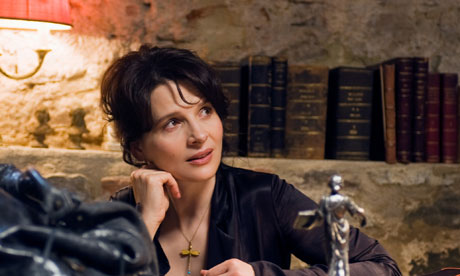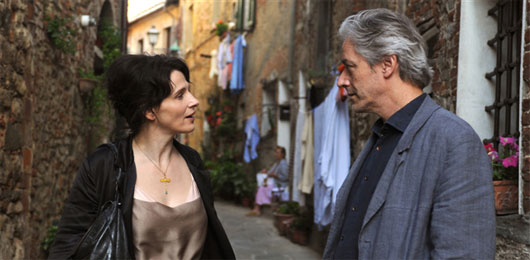There are all manner of interesting ideas put forth and never fully explored in Abbas Kiarostami's first "Western," which is to say his first film shot in the West, outside of Iran. There is writer James Miller (William Shimell) presenting his book Copie Conforme, a supposed meditation on the value of art, be it copy or original. As Miller and an apparent fan, an unnamed antiques dealer played by Juliette Binoche, head off in her car for the Tuscan village of Lucignano, the dialog about art eventually gives way to an increasingly rancorous discussion about relationships. Here, seemingly, is the writer/director's most slippery of notions about the certified copy. The man and woman are mistaken for husband and wife by a matron of a Lucignano restaurant. They decide to play along. But so impassioned do they become in their roles, so heated becomes their discussion, that one begins to think they might be a couple married for 15 years after all. Perhaps the pretending to be strangers was the game, the copy.
What most films critics have missed in lining up to laud Certified Copy is the possibility that they have witnessed something that is only a simulacrum of a good film. If you put a formidable actress and an acclaimed director together to present a story that at least touches upon lofty subjects like art, reality and love, it has to be good right?
The Binoche character (credited simply as "Elle"), shows up late with her son to the book talk given by Miller. She speaks to the writer's agent, leaves a note with him and then departs with her restless boy. Miller later appears at her antiques store. It's not clear why the writer has done so, but whatever she wrote in that note clearly did the trick. It's the first of many fairly naked contrivances on the part of Kiarostami; but at this point, the slightly prickly non-chemistry of the two, the air of uncertainty that prevails seems enough to merit playing along.
As "She" drives Miller through Arezzo and into the Tuscan countryside, they discuss the subject matter of his book. Miller's premise is that the copy of a work of art is as valuable or as valid as the supposed original. The Mona Lisa, after all, is simply "a copy of the beauty of Lisa del Giocondo." Well, yes. Unfortunately, there's no one in the car - certainly not "She" who gets to make little more than an emotional, knee-jerk reaction to Miller's theories - to say something like, "Sure, that's true. But isn't that true for every painting, every book, every piece of music ever conceived? No work of art is created in a vacuum. But isn't one of the things that defines a work of art is that - despite its perhaps obvious inspirations - it is, in fact, a creation that has never quite existed before?" That's but one of many possible salvos in a discussion that could well bleed into conceptual art and any number of related topics. But that's all rather more than Mr. Kiarostami, or Mr. Miller by extension, have in mind.
The conversation continues as Miller autographs copies of the book for the Binoche character. He extends his flimsy thesis to human beings: “It might be said that we are only the DNA replicas of our ancestors.” Again, a bold-sounding statement that really doesn't say much of anything. What is becoming clear at this juncture of Certified Copy is that personalities and arguments are breaking down along cliched gender lines. She is feeling, believing in art as in love. He's more analytical, unfeeling, emotionally stunted. Actually, Miller and his ideas just seem facile, which is a result of Mr. Kiarostami's poor attempt at creation of a genuine character. Miller owns that perhaps he has just written Copie Conforme to convince himself of his own ideas. The dialog between the two (mainly his) as they motor toward Lucignano is little better than the sort of pseudo intellectual cant that has plagued many a Woody Allen film.
It's in Lucignano, after the fateful encounter at the trattoria, that the two begin to behave as husband and wife. One doesn't buy this, as apparently did David Denby of The New Yorker because "we accept it as a possible new mating ritual among the hyper-educated." No, we don't go along for that reason. That would just be stupid. But there seems hope at this juncture this something interesting might still transpire. Also because Mr. Kiarostami has earned some trust. And if you're like me, you would follow Juliette Binoche through hell. Or even Euro Disney.
During a conversation in that Lucignano restaurant, the film has a high point of sorts, or at least a last glimmer of promise before it all starts coming apart. "She" asks Miller where he got the idea for his book. The writer explains that he was in the Piazza della Signoria one day when he saw a woman talking to her boy near the Michelangelo David. This is pertinent in the context of the film and Miller's work, because the David which stands in the piazza is a copy of the original, which is housed in the nearby Accademia (both in Florence). As Miller explains the significance of the encounter, seeing the mother near the copy of David, struggling with her son, we see Binoche grow more serious and then finally shed one of those significant, single tears. She says, "I wasn't well in those days." Miller only then realizes that the mother of whom he has been speaking is the woman sitting opposite him.
With that, we seem to be getting somewhere, close to something real. Kiarostami has finally struck a note which doesn't seem out of tune. Unfortunately, the moment passes and Certified Copy really begins to lose its way.
It's almost inexplicable that Miller would play along with the charade of being married, given how relatively aloof he has held himself to the moment of being mistaken for his companion's husband. And little which happens after the game begins suggests that he's enjoying the role playing. Not long into the apparent charade, the pair are at a Lucignano museum in which the Binoche character wants to show him a picture long thought original but more recently proven a fake. This, it would seem, is right up Mr. Miller's alley. But he betrays not the least enthusiasm. When a young couple just married, having photos taken in the museum, try to include our would-be man and wife, it practically takes a gun to Miller's temple to get him to him to participate.
If you're going to take a story in a fanciful direction, be it science fiction, horror, or whatever else, the farther out you take matters from the real and everyday, the more important there be a logical center from which everything is so delicately cast. There is very little consistent about James Miller's behavior or William's Shimell's acting once Mr. Kiarostami sets his flawed story-telling mechanism in motion. After the museum the pair stop in another restaurant. The Binoche character excuses herself. We then have a mirror's persepctive as she applies lipstick, hangs a couple of festive red earrings. It's an effective shot, largely due to Binoche's presence, the anticipation she's able to suggest with these prosaic rituals. Clearly, our Elle is hoping that the day's journey is taking a turn for the romantic. She's hoping for some recognition of her beauty, some warmth. Boy, is she out of luck. And, as it happens, so are we, stuck in the restaurant like stranded souls at an adjacent table while a painful scene unfolds.
By the time "She" returns, the writer has apparently suffered a precipitous drop in blood sugar. His wine is awful, he can't get the waiter's attention...he seems to need a binky and a nap. As Miller sits at the table, running through a range of negative emotions, it's as if the director or some poor assistant is holding up cards just off camera that read: ANGER!...PETULANCE!... IMPATIENCE!...UNDERWEAR WAY TOO TIGHT!!. The unfortunate result is like bad theater, or worse, bad jazz.
 |
| Oh honey, he's not worth it. La Binoche in Certified Copy. |
Interpret Certified Copy how you will - strangers playing at long-married couple trying to rekindle their romance, or just that same actual couple. It doesn't matter. Mr. Kiarostami seems out of his element in more ways than one. This dialog-heavy exercise is beyond him. Neither version is convincing, and given that what we're watching is probably a matter of pretend, it seems particularly without any weight in the end. Any long term-relationship is going to be marked by seemingly out of the blue flashes of anger or hurt, reactions out of all proportion to something seemingly innocuous when old grievances, old wounds, are pricked. This happens. What's real and what's not in the context of a realationship or a work of art, what even constitutes reality...these are profound subjects. Certifed Copy demonstrates neither the courage nor grace to do them justice.
When Juliette Binoche stammers, "Ja-Ja-James," lying on a bed in a Lucignano hotel, there are few more moving things you are likely to see or hear emanating from a movie screen this year. The significance of the stammer was earlier established. She and James find themselves in the hotel when the former says it was where they spent their honeymoon. They're allowed to revisit the room by a conveniently accomodating desk clerk. She lies on the bed, he stands, keeps his distance and ultimately reminds her that he has a train to catch at nine o'clock.
Binoche is a wonder. As she rolls slightly on the bed as the last sad act of this play wimpers toward its conclusion, she seems to have transformed herself into that woman 15 years younger. So it appears as we catch glimpses of her face in Luca Bigazzi's dazzling, chiaroscuro shooting of the scene. If not for Binoche, the whole thing would have spun out of control much sooner and much more disastrously.
Certified Copy, despite its flirtation with big ideas, turns out to be a frustratingly blank slate. The curious thing is all the profundity that critics and viewers have projected onto that slate. Whether this means there's an unquenched hunger out there for films that grapple with the fundamental issues of life, love and art - beyond, of course, the mysteries of the universe which have been explicated by the Twilight films - or there's a simpler, more expedient desire at work to go through the motions without really having to think too hard....I can't say. Despite all the hubbub around Abbas Kiarostami's current film, I don't imagine many people will remember it in ten years. If you have seen his Taste of Cherry, you're not likely to ever forget its climax. Certified Copy does have its brief, shimmering moments, due in large part to the photography of Luca Bigazzi and the brilliance of Juliette Binoche. But for the most part, sadly, this one is fool's gold.
db






Comments
Post a Comment